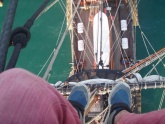I know in principle frigates were supposed to be able to outrun and outsail the bigger ships.
[Although I'm starting to think the speed differences weren't all that great (i.e. within the margins of whether your hull was weed-encrusted or whatever)--it seems like the SOLs could pack on so much sail that the better sailers among them could be pretty fast.]
Anyway, I remember in the O'Brien books, at least once Jack's frigate was captured by an SOL. Can't remember the details, I'm sure it involved the ships' relative positions to shore, etc. As I recall he tried every trick, but once the SOL could get off a reasonable warning shot he had to strike right away.
So I was wondering--was this an oddball occurrence, or was it not unusual for a frigate to be caught at the wrong place at the wrong time by a bigger opponent and have to surrender?






 Reply With Quote
Reply With Quote










 )
)

Bookmarks